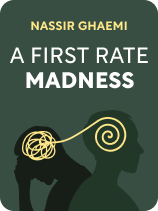

This article is an excerpt from the Shortform book guide to "A First Rate Madness" by Nassir Ghaemi. Shortform has the world's best summaries and analyses of books you should be reading.
Like this article? Sign up for a free trial here.
What is A First-Rate Madness about? What are the main takeaways of the book?
For years, abnormal mental health has influenced successful leadership decisions during critical times of war and conflict. In A First-Rate Madness, Nassir Ghaemi uncovers the pitfalls of being a mentally well leader and how mental health treatment affects leadership.
Read below for a brief overview of Ghaemi’s A First-Rate Madness.
A First-Rate Madness by Nassir Ghaemi
Many of us consider good mental health to be an important quality for leaders, whether they’re a nation’s president, a military general, or a CEO. However, in A First-Rate Madness, Nassir Ghaemi writes that while this may be true in times of peace and stability, leaders with mental illness are often better fit to lead during a crisis. He argues that mental illness contributed to the successes of historical leaders such as Winston Churchill and Franklin D. Roosevelt. According to Ghaemi, if we better understand how conditions like depression and bipolar disorder can enhance leadership, we can lessen the cultural stigma surrounding mental illness.
Nassir Ghaemi is a psychiatrist and director of the Mood Disorder Program at Tufts Medical Center. He has published numerous books as well as over 100 scientific articles on mental illness, with his research focusing on depression and bipolar disorder.
In this article, we’ll first define mental health and discuss how it relates to leadership. Next, we’ll explore Ghaemi’s evidence for the theory that abnormal mental health has influenced successful leadership decisions during critical times of war and conflict.
Mental Illness and Leadership
According to Ghaemi, some of the greatest leaders throughout history succeeded not in spite of, but because of their experiences with mental illness. Although conditions such as depression and bipolar disorder can be harmful and exhausting to those who suffer from them, Ghaemi argues that these same disorders can also cultivate powerful leadership qualities.
Defining Mental Health and Mental Illness
Before we can discuss how mental illness can contribute positively to leadership, we must first understand what Ghaemi means by mental health and mental illness.
Mental Health: Ghaemi defines mental health as having no signs of psychological diseases (such as depression) as well as having normal personality traits based on the average population.Mental Illness: According to Ghaemi, someone who’s mentally ill has both the presence of an illness and abnormal personality traits.
Ghaemi argues that, beyond mental illness and wellness, there’s a third category to consider. Some people have abnormal personalities or temperaments, meaning they’re neither ill nor completely healthy. This third category can exist because mental health lies on a spectrum—there’s no definite line dividing mental wellness and mental disorder.
Ghaemi explains that personalities generally form around the age of three and remain relatively unchanged throughout adulthood. People with abnormal personalities have natural traits similar to symptoms of mental illnesses, but those traits are milder and longer-lasting. For example, someone might naturally be more melancholic and have lower energy compared to the average population but not be depressed.
Unlike for physical diseases, there aren’t any tests that can definitively diagnose mental illness. To make his diagnoses of deceased historical figures, Ghaemi researched for evidence of symptoms, how long the symptoms lasted, family history, and treatment history.
Ideal Mental Health and Two Mental Conditions Affecting Leadership
When it comes to leadership or politics, Ghaemi argues that there’s no such thing as an ideal level of mental health. Rather, the best level of mental health depends on the situation. In peaceful times, good mental health offers many advantages for leadership. However, in turbulent times, mental illness tends not only to produce better leaders, but good mental health can actually produce worse leaders.
The reason for this, Ghaemi argues, is that mental illness puts the leader through unique struggles and experiences that enhance traits that are important for navigating sensitive crises. Specifically, leaders during crisis times must have broad perspectives and understand multiple viewpoints and be resilient and innovative in response to unpredictable and unprecedented challenges. Ghaemi identifies two mental illnesses in particular, along with their milder abnormal personality characteristics, that encourage these leadership traits.
How Depression Improves Perspective and Understanding
In this section, we’ll first look at how depression can strengthen a leader’s sense of perspective and understanding, providing them with the right insights to handle critical moments. According to Ghaemi, depression does this in two ways.
1) Depression Gives You a Realistic Perspective
In Ghaemi’s eyes, leaders who either suffer from depression or have dysthymic personalities are better at realistically assessing critical situations, while mentally healthy leaders are too optimistic. To illustrate this, Ghaemi points to experiments showing that mentally healthy people tend to overestimate how much control they have over situations—for example, they overestimate their ability to predict the results of coin tosses or to control random events.
This phenomenon is called an “illusion of control.” The experiments Ghaemi discusses showed that people with depression have a more realistic perception of control over their environment, more accurately judging their ability to predict chance events or to influence those events.
Ghaemi contends that, for leaders, this illusion of control can develop into the hubris syndrome, a term coined by David Owen, who argued that people in power become increasingly overconfident in their beliefs and abilities and refuse to adapt to changing circumstances. This stubborn optimism can cause leaders to make wrong decisions when managing sensitive situations.
2) Depression Enhances Your Empathetic Understanding
In addition to enhancing realistic judgment, Ghaemi contends that depression also broadens a leader’s perspective and understanding by making them more empathetic, a trait that allows them to effectively navigate critical situations.
Empathy is more than just relating to someone else—when you empathize, you truly experience what someone else is experiencing. Ghaemi explains that your brain has mirror neurons that activate when you see someone doing or feeling something. These allow you to feel as though you actually think someone else’s thoughts or feel their emotions, movements, and sensations.
Ghaemi points to studies that link depression to higher empathy, particularly on an emotional level. He explains that depressive episodes leave you with a lingering sensitivity to other people’s experiences and allow you to better relate to them. This empathy ultimately allows you to understand multiple viewpoints, which is a key leadership trait.
How Mania Prepares Leaders for Unprecedented Challenges
Now that we’ve examined how depression enhances leadership, let’s discuss how mania can help leaders not only understand critical situations, but also overcome them. According to Ghaemi, mania and hyperthymia can make a leader uniquely prepared to tackle unprecedented challenges by boosting their resilience to adversity and encouraging innovative thinking.
1) Mania Enhances Your Ability to Overcome Adversity
Ghaemi contends that mania can enhance your ability to overcome adversity because it naturally elevates your mood and energy while decreasing anxiousness and self-doubt. This also applies to people with hyperthymic personalities who naturally have positive traits such as a sense of humor, enthusiasm, and open-mindedness, all of which combine to make a leader more capable of handling trying circumstances.
Additionally, beyond just mania, mental illness prepares leaders to overcome difficult challenges because mental illness is, itself, challenging to deal with. Struggling with any illness—whether physical or mental—can make you stronger and help you to overcome future hardships. In other words, a moderate amount of adversity makes you psychologically healthier than if you experience no adversity at all.
2) Mania Improves Innovative Thinking
In addition to helping leaders overcome adversity, mania can enhance a leader’s creativity, allowing them to generate innovative solutions to unprecedented challenges. Ghaemi defines creativity as the ability to both come up with inventive solutions and detect key problems that others fail to notice.
According to Ghaemi, symptoms of mania promote divergent and complex thinking, making people more aware of nuances that encourage new insights. This enhanced creativity allows leaders to break free from traditional approaches and to generate new solutions, both important when navigating unprecedented conflicts. Ghaemi argues that mentally well leaders, on the other hand, tend to be more confined to conventional strategies that are reliable for peacetime politics but disadvantageous during crises.
How Mental Wellness and Treatment Affect Leadership
Ghaemi not only explains how mental illness can foster positive leadership traits, but he also details the specific ways that mental health can contribute to leadership failures. In addition, he argues that the manner in which you treat mental illness can affect leadership abilities—proper treatment can enhance positive traits while improper treatment can impair crisis decision-making.
Good Mental Health Is Bad During Crises
According to Ghaemi, mentally healthy leaders often make bad decisions during crises—they tend to be overly optimistic, less empathetic, unchallenged by struggles, and inflexible when compared to mentally ill leaders. He argues that while such leaders can be effective during peacetime, they often lack the right instincts during times of conflict. To make his point, he examines how mental health negatively affected the leadership of Neville Chamberlain, George McClellan, George W. Bush, and Tony Blair.
Ghaemi argues that the reason Neville Chamberlain, the prime minister preceding Winston Churchill, was unable to accurately assess the threat Hitler posed to the world was that Chamberlain was too mentally stable. Unlike Churchill, Chamberlain took a more conciliatory approach to the Nazi threat. Ghaemi argues that Chamberlain’s mental health prevented him from understanding the reality of the situation—that appeasement wouldn’t be an effective solution. Instead, the Prime Minister was overly optimistic, dismissed the German dictator’s belligerent intentions, and believed that war could be avoided through negotiation.
Similarly, Ghaemi argues that the sound mental health of General George B. McClellan, another Union commander during the Civil War, contributed to his military failures. Unlike with General Sherman, Ghaemi found no evidence that General McClellan suffered from any mental illnesses, and this prevented him from having bold, creative insights. McClellan consistently misjudged his enemies and limited himself to the traditional strategies he’d learned at West Point. His good mental health limited his ability to think outside the box and made him inflexible.
Finally, Ghaemi examines the leadership of George W. Bush and Tony Blair during the September 11 attacks in 2001, arguing that neither leader possessed the understanding or flexibility to properly handle the situation. Based on a review of their pasts, Ghaemi determines both Bush and Blair to be mentally healthy. He argues that both failed to approach the conflict with a nuanced perspective and decided to use military power to invade Iraq, a controversial decision that many have criticized.
How Proper and Improper Mental Health Treatment Affects Leadership
According to Ghaemi, the treatment of mental health also affects leadership—proper treatment can improve leadership while improper treatment can negatively impact leadership abilities. To explain how, Ghaemi takes us through the medical history of John F. Kennedy and Adolf Hitler.
According to Ghaemi, President John F. Kennedy and Adolf Hitler shared two notable similarities as leaders: Both had manic tendencies and both were treated with drugs that altered their mental states. While Kennedy successfully guided the US away from nuclear war thanks to his hyperthymic personality, Hitler set into motion a costly war that resulted in mass death and destruction.
For the first half of his presidency, doctors treated Kennedy with four kinds of steroids daily, which drastically altered his mood and impaired his ability to lead. However, by the early 1960s, they cut back on his steroid use, better managing the treatment of his mental illness. This proper treatment, Ghaemi argues, enhanced Kennedy’s positive manic traits (such as his high energy and resilience), contributing to his leadership successes during the second half of his presidency.
Specifically, these treatments allowed him to act appropriately when Soviet leader Nikita Khrushchev brought nuclear missiles to Cuba. Rather than limit himself solely to the black-and-white options of military action or inaction like Bush or Blair later would, Kennedy chose to establish a naval blockade that successfully led to Khrushchev withdrawing the missiles and avoided warfare.
In contrast, the improper treatment of Hitler’s bipolar disorder with amphetamines severely impaired his ability to lead. Before his abuse of drugs, Ghaemi argues, Hitler possessed many of the same positive leadership qualities associated with bipolar disorder such as the creativity of mania and the realistic judgment of depression. His abuse of amphetamines in 1937, however, exacerbated his illness, leading him to make extreme and aggressive military decisions that catapulted the world into World War II.

———End of Preview———
Like what you just read? Read the rest of the world's best book summary and analysis of Nassir Ghaemi's "A First Rate Madness" at Shortform.
Here's what you'll find in our full A First Rate Madness summary:
- How mental illness can make someone a better leader
- How leaders like Churchill and Roosevelt benefited from mental illness
- The pitfalls of being a mentally well leader during a time of crisis






